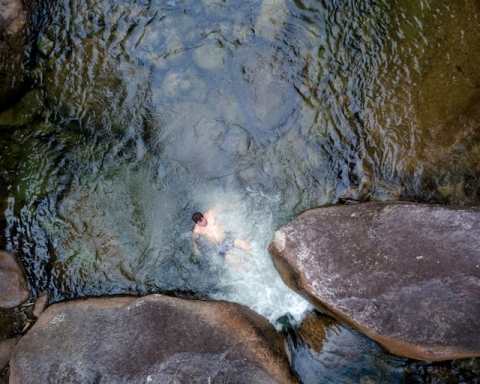

The Royal Life Saving Society UK has shared top recommendations for safer open water swimming, using advice and guidance from Portsmouth research.
24 July 2024
7
Ahead of the school summer holidays and World Drowning Prevention Day (25 July), people are being reminded of the risks of open water swimming to prevent serious injury or loss of life.
Experts from the Extreme Environments Laboratory (EEL) at the University of Portsmouth have supported the Royal Life Saving Society UK (RLSS) in providing advice and guidance for anyone wanting to take a dip outdoors.
According to RLSS UK's National Drowning Report 2023 warmer weather is directly linked to an increase in fatal drowning incidents. 46 per cent of drownings occur in the summer months of which 75 per cent are aged between 13 to 17 years old.
In the past five years, nearly a quarter of all accidental drownings have occurred when swimming at open water sites, either inland or along the coast. Many of these lives could have been saved with some basic knowledge and understanding of open water safety.
Recommendations include:
- Plan your swim
- Have the right equipment
- Know your limits
- How to stay safe and get help
- Recognise when you’re too cold
- Know how to help someone in the water and in difficulty
- Know when not to go!
A full breakdown of the advice can be found on the RLSS website here.
Robert Gofton, CEO of RLSS UK, said: “As open water swimming becomes increasingly popular in all weathers, we’re pleased to be partnering with the University of Portsmouth and releasing new updated swimming water guidance to ensure people are aware of what they need to take into account before they get in, and when they are in the water.
“From beginners to well versed swimmers, this newly released open water swimming guidance is invaluable for anyone looking to enjoy open water sites across the UK, providing them with the tools to stay safe while enjoying all the benefits that come with this activity.”
Last year, the University’s Extreme Environments Laboratory (EEL) became the first institute to be given the inaugural Excellence in Physiology Award from The Physiological Society (TPS), the largest network of physiologists in Europe, supporting their members to improve lives through physiological discovery.
This prestigious honour serves to commemorate the EEL’s work influencing global search, rescue and out of hospital practices and policies, as well as improving both athlete and occupational safety in extreme environments.
The group has paved the way for critical enhancements in international water safety. Their efforts have given rise to ‘Respect the Water’ and ‘Float to Live’ national water safety campaigns.
Underpinned by EEL’s research findings, the RNLI campaigns have successfully increased public understanding of the importance of floating as a primary survival behaviour in water-related emergencies and has been reproduced internationally.
Co-founder of the University’s EEL, Professor Mike Tipton MBE, said: “The Extreme Environments Laboratory at Portsmouth University works to generate and openly distribute life saving information to those who end up in cold water. It has been a pleasure to contribute to this important publication by the RLSS that is released at the most dangerous time of year for drownings. I am sure the guidance will inform and educate, and thereby promote drowning prevention and save lives."
More like this...
Study to explore if outdoor swimming is helpful for depression after successful trial
28 March 2024
7

Study to examine outdoor swimming as a nature-based intervention for depression
26 July 2022
7 min read

MRI scans reveal changes in the brain’s wiring after cold water shock
A team of researchers have for the first-time observed changes in how different parts of the brain interact with each other after a person’s body is immersed in cold water. The findings explain why people often feel more upbeat and alert after swimming outside or taking cold baths.
7 February 2023
4 minutes

